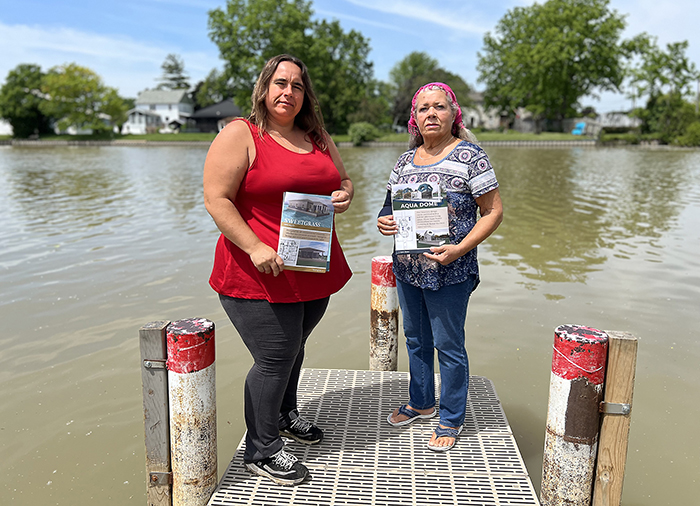
By Pam Wright
Local Journalism Initiative Reporter
Three Chatham-Kent residents say a Wallaceburg company that builds tiny floating homes has sunk their dreams.
That’s what Meg Connelly, Melissa Jacob and Keith Thompson have to say about Wallaceburg-based Stronghouse Canada Corp./Twin Dolphins Canada Corp. which owes the three of them a combined $412,000.
They were awarded the money – plus court costs – in an Ontario Superior Court of Justice judgment made in Chatham in November. The documents name company owner and president Alex Topol as the person who owes the money.
In a joint interview with The Chatham Voice, Connelly, and Jacob, speaking on behalf of her partner Thompson, said both parties put large deposits towards the purchase of the eco-friendly homes.
Today, all they have are empty bank accounts and broken promises.
As of press time, Connelly said she had received a total of $100 from Topol in 2024.
According to Connelly, 71, her journey began in 2020, when she read about Stronghouse Canada in a local newspaper. The retired nurse said she was thrilled about the possibility of living out her retirement in an ecologically sustainable home on the Sydenham River in Wallaceburg.
She reached out to Topol and quickly made the decision to put $100,000 down in January 2021 towards a $200,000 futuristic Aqua Dome model. Connelly subsequently sold her mortgage-free home and began to prepare for her new way of life.
An emotional Connelly said she had “faith” in Topol, noting he “begged” her to trust him. She did a credit check on Topol, which revealed nothing, and also consulted a local lawyer about the contract for good measure.
“It sounded magical to be able to get affordable housing on the water,” she said. “It seemed like such a great idea.”
Months passed and Connelly’s tiny floating home didn’t materialize. In 2021, she ended up living in a mobile RV that belonged to Topol in her daughter’s backyard. She spent a year there only to be told in January 2022 Topol couldn’t build the Aqua Dome model because it was top heavy.
More months passed and still no floating home. Connelly was given multiple delivery dates that came and went. In August 2022, after a great deal of back and forth with Topol and other Stronghouse Canada representatives, Connelly launched a civil suit to recoup her money. All told, she had $268,000 invested in the home, having purchased extras, including a $45,000 off-grid package.
Jacob’s saga with Topol and Stronghouse Canada began when she and her partner saw an ad from the company posted on a fence at the Lighthouse Cove marina. Thompson owns a lot there and the couple thought a tiny floating home would be perfectly suited to their needs.
Like Connelly, the pair – both truck drivers – was excited about the possibilities and put $101,000 down on the $350,000 Sweetgrass model. They also agreed to make payments of more than $2,697 per month until 2025.
Jacob said the couple was assured by Topol that the proper zoning applications were in place.
However, the couple later learned, as described in the 2023 civil judgment, that floating homes are not allowed in Lakeshore.
Time passed and no house was built. Jacob said the two began to doubt the deal. They stopped making payments after nine months and launched a civil case against Topol and the company.
According to Jacob, the issue has rendered unremitting stress.
“I’m surprised that we made it,” Jacob said of her relationship.
“I get a pain in my chest when I talk about it,” she added, touching her heart. “It’s awful. We just want our money back.”
Jacob and Thompson now find themselves attempting to cobble together a downpayment on a house. They are coping with a financial loss amounting to about $85,000 each.
Connelly has lost her life savings. Stronghouse Canada owes her $300,000, minus $15,000 she was paid by Topol just prior to the 2023 civil ruling.
But that money was eaten up by lawyer’s fees, Connelly said.
Connelly, who ended up buying an apartment in a Wallaceburg condominium complex, said she now has a mortgage – something she never envisioned after working for 43 years.
“I wanted to travel. I was downsizing so I could have less expenses. Now I’m looking for a part-time job,” she said.
“I want him (Topol) to go to jail,” Connelly said.
“Me too,” echoed Jacob.
When contacted by The Chatham Voice, Topol agreed to an interview. When questioned, he challenged many of the statements made by Connelly and Jacob, stating he has every intention of paying the money back.
Topol told The Voice he didn’t lie to his clients and when he repays them, he expects a “big apology.
“I never give up. I’m struggling here because I’m an old-fashioned guy and don’t want to betray people,” Topol stated.
The builder, who said he worked for the Canadian government for 14 years constructing military bases, blames the COVID-19 pandemic for derailing the company’s plans.
Topol said a contract to build 24 tiny homes in Arizona fell through and the pandemic stymied access to supplies and equipment. Plus, there were lengthy delays to ship a machine he owned from his native Europe needed to build the homes. The machine is used to create a lightweight composite material used in constructing the tiny structures, he said.
Topol was quick to point out that the tiny homes in question are in fact, floating vessels and can be located anywhere on water. This was in response to statements made by Connelly and Jacob saying he falsely told them he had approval from Lakeshore and Chatham-Kent to go ahead.
Going forward, Topol said he’s in talks to build a tiny home complex comprised of 82 tiny homes or vessels in an undisclosed location in Ontario. When he seals the deal, Topol said he’ll pay the money back “as soon as he can.”
However, he no longer has a shop and all of his equipment is warehoused in different spaces.
Currently, Topol is living in an RV at a Wallaceburg scrapyard and is not building any vessels or tiny homes.






